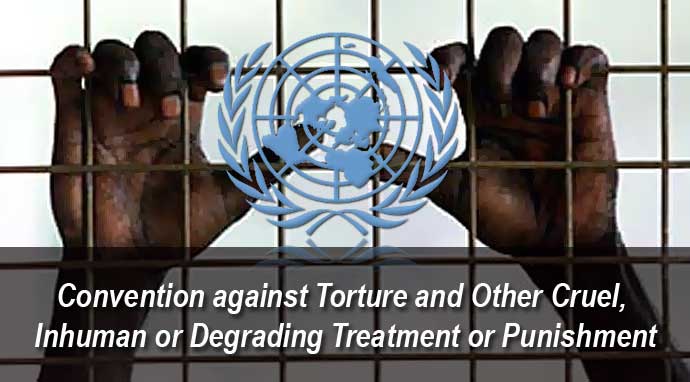Convention against Torture and Other Cruel, Inhuman or Degrading Treatment or Punishment (UNCAT) (1984)

Key Info
- Type: Human rights convention
- Drafted: 10 December 1984
- Signed: 4 February 1985
- Location: New York
- Effective: 26 June 1987
- Condition for entry into force: 20 ratifications
- Signatories: 83
- Parties: 173
- Depositary: UN Secretary-General
Summary
The Convention Against Torture and Other Cruel, Inhuman or Degrading Treatment or Punishment (UNCAT) is an international human rights treaty under the review of the United Nations. It aims to prevent torture and other acts of cruel, inhuman, or degrading treatment or punishment worldwide. The Convention consists of a preamble and 33 articles, divided into three parts:
Part I: Obligations to Prevent and Prohibit Torture
- Article 1 defines torture as the intentional infliction of severe physical or mental pain or suffering for various purposes.
- Article 2 requires member states to take effective measures to prevent torture within their jurisdiction.
- Article 3 prohibits the transportation of individuals to countries where there are grounds to believe they will be tortured.
- Articles 4, 5, 8 establish criminalization of torture, jurisdiction over acts of torture, extradition, and universal jurisdiction.
- Articles 10 and 11 emphasize training and education of public servants to prevent torture.
- Article 12 mandates prompt investigation of torture allegations.
- Article 13 ensures victims’ right to compensation.
- Article 15 prohibits the use of evidence obtained through torture.
- Article 16 extends the prohibition to cruel, inhuman, or degrading treatment or punishment.
Part II: Reporting and Monitoring
- Article 17 establishes the Committee Against Torture to monitor implementation.
- Article 20 empowers the committee to investigate allegations of systematic torture.
- Article 21 provides a dispute-resolution mechanism between parties.
- Article 22 allows individuals to submit complaints to the committee.
Part III: Ratification and Amendment
- Articles 25-33 govern ratification, entry into force, amendment, and arbitration.
Main Provisions
Definition of Torture
- Article 1.1 defines torture as the intentional infliction of severe physical or mental pain or suffering for specific purposes, by public officials or others acting in an official capacity.
Ban on Torture
- Article 2 prohibits torture, with no exceptions allowed, including during war, emergencies, or armed conflicts.
- Subordinates cannot escape responsibility by claiming they were following orders.
Ban on Refoulement
- Article 3 prohibits the return, extradition, or refoulement of individuals to a country where there are grounds to believe they would be subjected to torture.
Ban on Cruel, Inhuman, or Degrading Treatment or Punishment
- Article 16 extends the prohibition to acts that do not meet the definition of torture but are still cruel, inhuman, or degrading.
Optional Protocol
The Optional Protocol to the Convention Against Torture and Other Cruel, Inhuman or Degrading Treatment or Punishment (OPCAT) establishes a system of regular visits to places of detention to prevent torture and other cruel treatment. It is overseen by a Subcommittee on Prevention of Torture and Other Cruel, Inhuman or Degrading Treatment or Punishment. The Protocol has 76 signatories and 91 parties.
Committee Against Torture
The Committee Against Torture (CAT) monitors the implementation of the Convention by state parties. States are required to submit regular reports to the CAT on their implementation efforts. The committee examines reports, provides recommendations to states, and considers complaints from individuals alleging violations of the Convention. The CAT meets in Geneva twice a year and consists of elected members serving four-year terms.
Effects
A study found that countries adopting national laws prohibiting torture, in line with UN standards, experience reductions in police torture.

